How to Take Care of a 10-Month-Old German Shepherd
There are few dogs more iconic than the German Shepherd. The German Shepherd breed is loyal, hardworking, and intelligent, and is perfect for families and individuals.
While German Shepherd puppies are undeniably one of the best pets you can have, they require a lot of time and energy to raise. Each stage of their life means a new challenge for pet parents.
Our past articles talked about German Shepherd puppies in their different life stages. In this article, we will discuss all you need to know about German Shepherds once they reach 10 months old.
We’ll go through their average size and height, nutrition, exercise needs, basic training, and behavior.
Average Size and Height

At 10 months old, your German Shepherd is considered a young adult. Physically, they will have reached their full height but will still be filling out.
German Shepherds are a medium to large breed and are usually still growing, reaching their full adult size by 18 months to 2 years of age.
In most cases, a male German Shepherd is bigger than his female counterpart in both height and weight.
A German Shepherd’s height is measured at the withers, the highest point on its body when standing. That is the back section just above their shoulders at the bottom of their neck.
The average size and height of a German Shepherd at ten months is 55 to 60 cm for males and 49 cm for females.
Usually, male German Shepherds weigh between 63 to 73 pounds, while females weigh between 57 and 62 pounds. Some individual dogs may range in size, but most will fall within this range.
Nutrition for a 10-Month German Shepherd
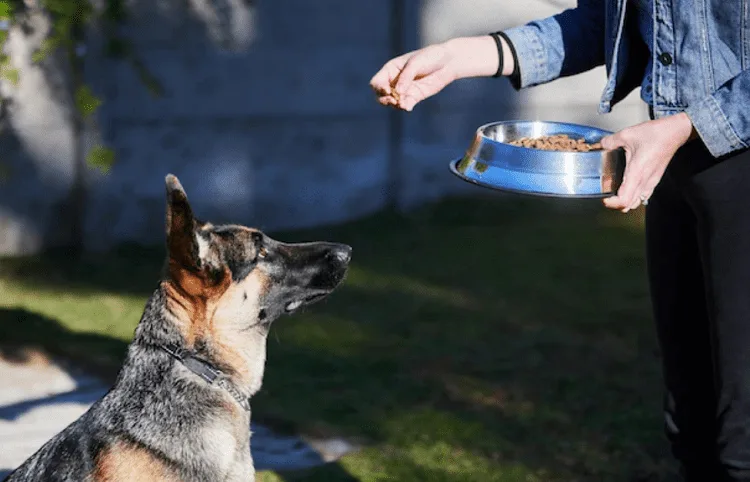
German Shepherds are large dogs with different dietary needs than smaller dog breeds. They should get the right combination of vitamins, minerals, and fat.
It would be best to feed your German Shepherd at least two meals a day when they reach 10 months old.
Choose high-quality animal-based protein sources, such as beef, pork, chicken, lamb, fish, and eggs when feeding your German Shepherd.
You can also include plant-based proteins like legumes and grains. German Shepherds are prone to joint problems, so ensure that their diet contains enough omega-3 fatty acids for joint health.
Dry food is the best for your German Shepherd, and the most cost-effective, even with a high-quality brand. To bring in variation, you can feed your dog both dry and wet food alternately.
As your German Shepherd puppy grows, pay close attention to his eating habits, making sure to meet the changing needs of his diet.
A healthy diet is essential for supporting your German Shepherd’s growth and development.
Physical and Behavioral Changes
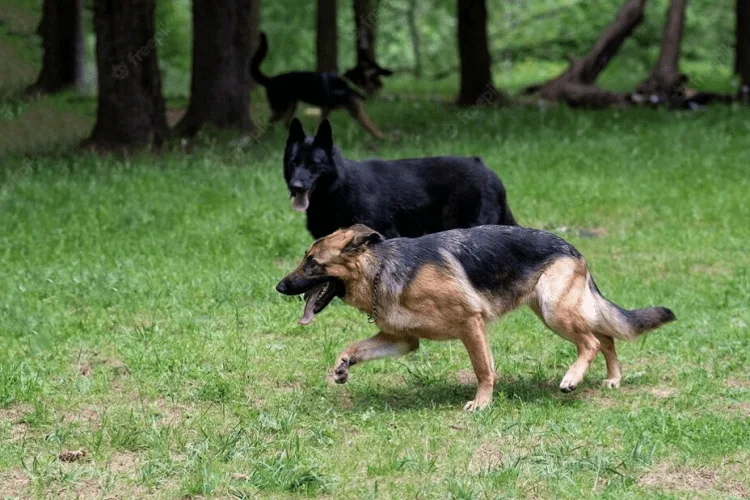
By this age, our German Shepherd will have essentially finished growing. They will, however, continue to fill out and increase in muscle mass until they reach around 18 months old.
You may also notice that their coat becomes glossier and thicker during this time.
One of the most noticeable changes you’ll see in your German Shepherd is an increase in energy level. They are often full of energy and enthusiasm because they are now entering adolescence.
They are also very curious and may be more prone to exploring and getting into mischief.
As a result, providing them with plenty of stimulation through interactive games, training, and walks to help burn off excess energy is vital.
They will become more independent and may start to challenge your authority, even becoming more protective of their territory. Though, they like socializing with other dogs.
Females generally come into heat (ovulate) twice a year, although some may only do so once a year, or as infrequently as once every 18 months. Each heat cycle lasts approximately three weeks.
During this time, the female German Shepherd will be receptive to mating with males. In this stage, they have already reached their sexual maturity, meaning they can produce offspring.
Spaying or Neutering Your German Shepherd
Spaying (for female German Shepherds) and neutering (for male German Shepherds) is the surgical removal of an animal’s reproductive organs, either in whole or in part.
A vet does the procedure, and it is considered to be a safe and routine operation.
There are many benefits to spaying or neutering, both for the animal and for the owner.
For example, the procedure can help reduce territorial aggression, roaming behavior, and the risk of some types of cancers.
Spaying or neutering also helps control the pet population, preventing animals from producing unwanted litter.
The decision to spay or neuter your dog is based on the individual animal and the owner’s needs and preferences.
Training Your 10-Month German Shepherd
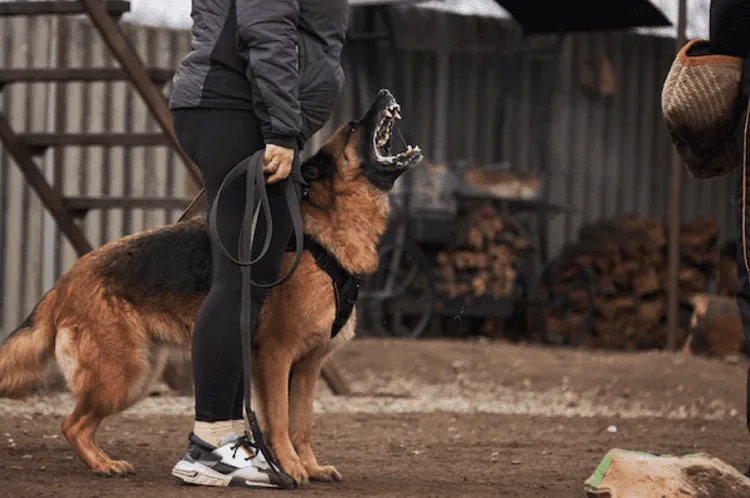
When training, you should be firm but gentle. German Shepherds are quick learners, but they can also be stubborn.
Your dog should already master the basic commands such as sit, stay, and come. You should also begin to introduce more advanced commands such as heel and rollover.
The best way to train your dog is to use positive reinforcement techniques such as treats or praise.
However, be consistent with your commands and rewards during obedience training, or your dog will quickly become confused.
You should find creative ways to keep their attention during dog training sessions. For example, you might want to try using food puzzles or interactive toys to keep your German Shepherd engaged.
Give them plenty of time to practice new skills.
What Treats Should You Give Your Dog
When it comes to treats, choose something your dog loves. That way, he’ll be motivated to work hard for the reward.
Small, soft treats are often best since they’re easy to eat and won’t slow down the training session.
You should avoid giving your dog too many treats, leading to weight gain. Instead, focus on quality over quantity.
A few small, healthy treats per session will do the trick. Here are a few of the best treats for dogs during training:
- Cheese – Dogs love cheese, and it’s easy for them to eat quickly. Be sure to choose a low-fat variety, so you don’t overload your pup with calories.
- Chicken – Another popular option among dogs is a lean protein that is easy on the stomach. You can offer cooked chicken pieces or shred some raw chicken into small chunks.
- Vegetables – Dogs may not be as fond of vegetables as meat, but most will still enjoy the occasional carrot or green bean as a treat. Just chop them into small pieces, so they’re easy to eat.
Whichever treats you choose, give them sparingly, so your dog doesn’t become overweight. Always keep in mind the goal is to reward good behavior, so don’t overdo it.
Toys for 10-Month German Shepherds

Look for toys that are durable and specifically designed for dogs. Avoid small toys that could pose a choking hazard, and opt for ones that will encourage your dog to be active.
One option is to select a toy that encourages your dog to use its natural predatory instincts. For example, you might want to choose a toy that resembles a small animal or bird.
These toys can help your German Shepherd burn off excess energy and stay mentally stimulated.
Another option is to choose a toy that helps to satisfy your dog’s chewing needs. There are a variety of chew toys on the market that are specifically designed for German Shepherds.
These kinds of toys can help to keep your dog’s teeth clean and healthy while providing them with a source of entertainment.
Other good toys for German Shepherds are balls and tug toys. Balls are great for fetching, and tug toys can help your dog to burn off excess energy.
10-Month German Shepherds – Health Issues
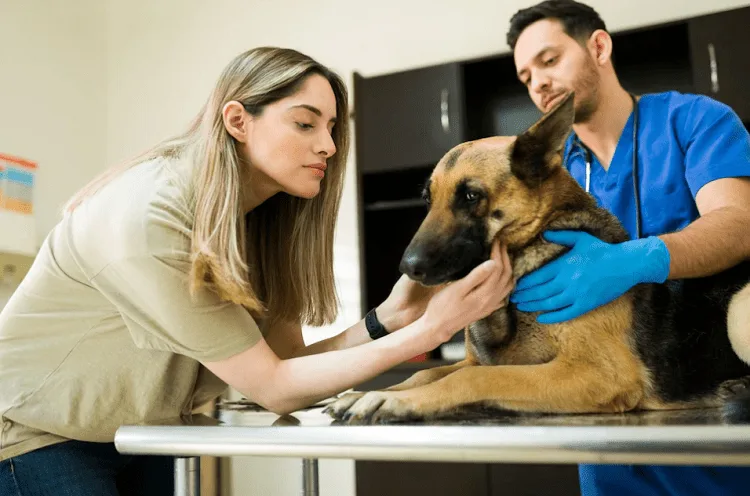
Like all breeds, German Shepherds have their own health concerns. Here are some of the most common health problems of this breed.
- Allergies: Allergies are one of the dogs’ most common health problems, and German Shepherds are no exception. Allergies can cause various symptoms, including itching, redness, hair loss, and ear infections.
- Arthritis: Arthritis is a common age-related condition that can cause joint pain and stiffness. If your dog shows signs of arthritis, such as limping or difficulty getting up, take him to the vet for treatment.
- Cancer: Cancer is a severe health problem that can affect any age. However, German Shepherds are more susceptible to certain types of cancer, such as lymphoma and bone cancer.
- Gastrointestinal Issues: Gastrointestinal issues, such as diarrhea and vomiting, are common in dogs. Large breeds are particularly prone to gastrointestinal problems due to their large size and fast metabolism.
- Elbow and Hip Dysplasia: Elbow and hip dysplasia are common joint problems that cause pain and lameness. A German Shepherd is particularly susceptible to these conditions due to their large size. If you have any concerns about your dog’s health, you must consult with your vet to address the problem immediately.
Exercise Needs for 10-Month-Old German Shepherds
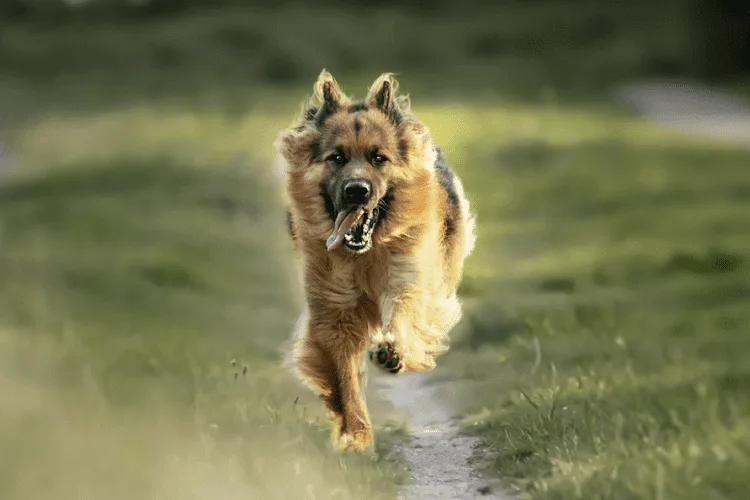
Once he reaches this age and beyond, your German Shepherd should have at least two hours of exercise per day, which can be divided into several walks or play sessions.
German Shepherds love to run and play, so activities like fetch or Frisbee are usually a hit. However, make sure that your dog is getting enough mental stimulation as well as physical activity.
Interactive toys and games, such as puzzle toys or nose work, can be a great way to give your dog the mental stimulation he needs. If you can’t give them enough exercise, they may become restless or destructive.
Sleep Requirements for 10-Month-Old German Shepherds

German Shepherds need about 18 to 20 hours of sleep daily. It may seem like a lot, but they must grow and develop properly.
You should provide them with a comfortable place to sleep during their nap times, such as a dog bed or a blanket.
German Shepherds are very active dogs and often have a lot of energy to burn off. As a result, they may not always be able to sleep during the day.
If your dog is not getting enough sleep, you may need to adjust its exercise routine. Make sure they have plenty of time to run and play with at least one period of rest during the day.
Also read:
- Caring for a 9-Month-Old German Shepherd
- How to Take Care of an 8-Month German Shepherd
- 7-Month-Old German Shepherd
Conclusion
As a German Shepherd owner, you confidently know the basics of caring for your dog. Owning dogs requires commitment, and with that, great responsibility.
It is essential to make sure your furry friend is getting the proper nutrition, plenty of exercises, is well-behaved, and is getting enough rest.
By following these guidelines and giving your dog plenty of love, you will ensure a happy and healthy life for you and your best furry friend.
Resources:
















